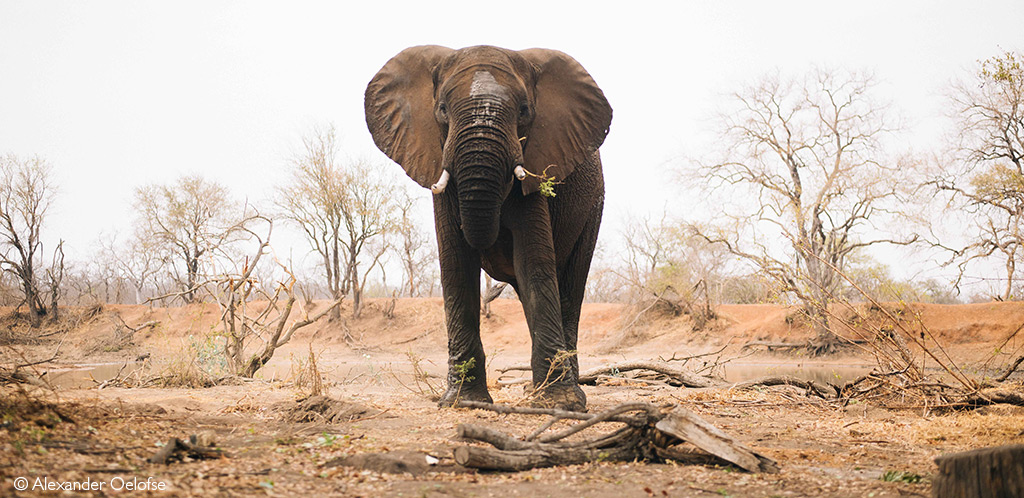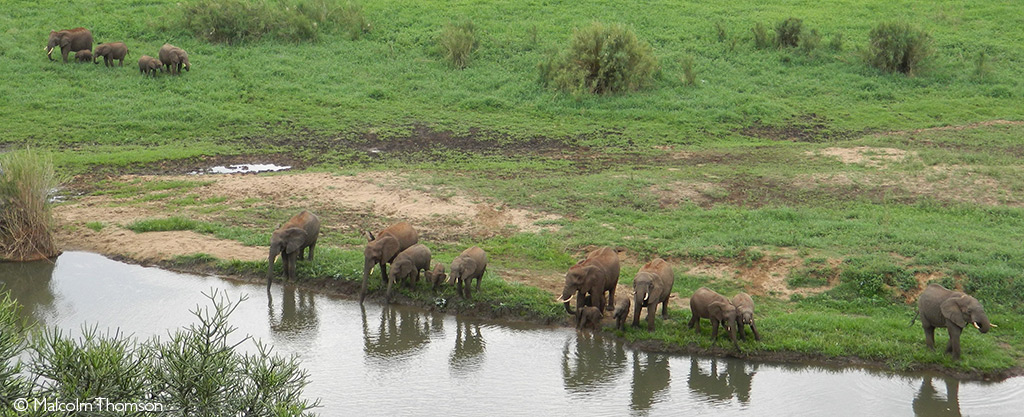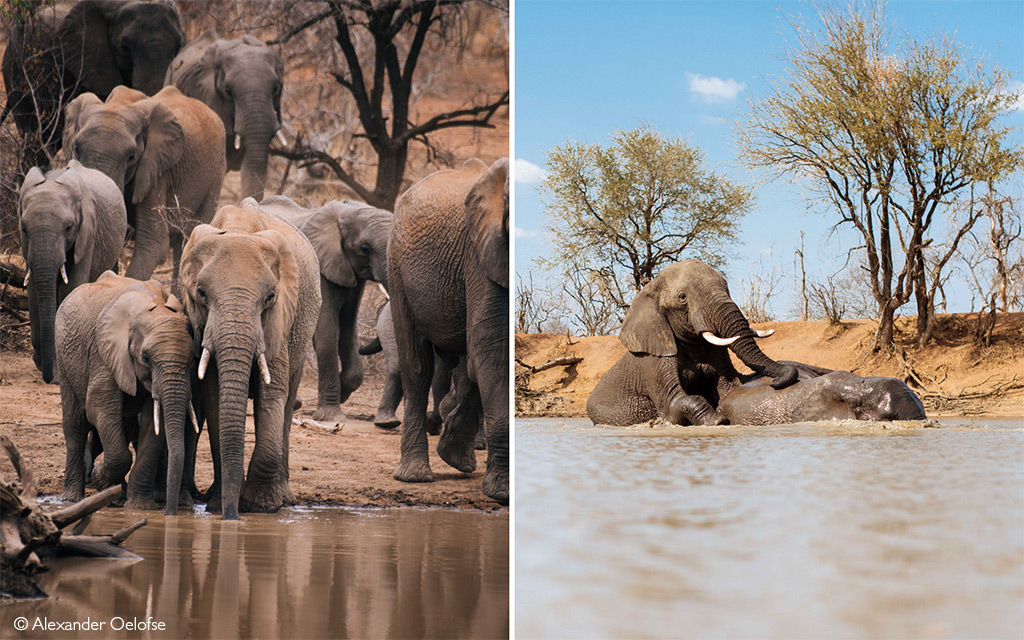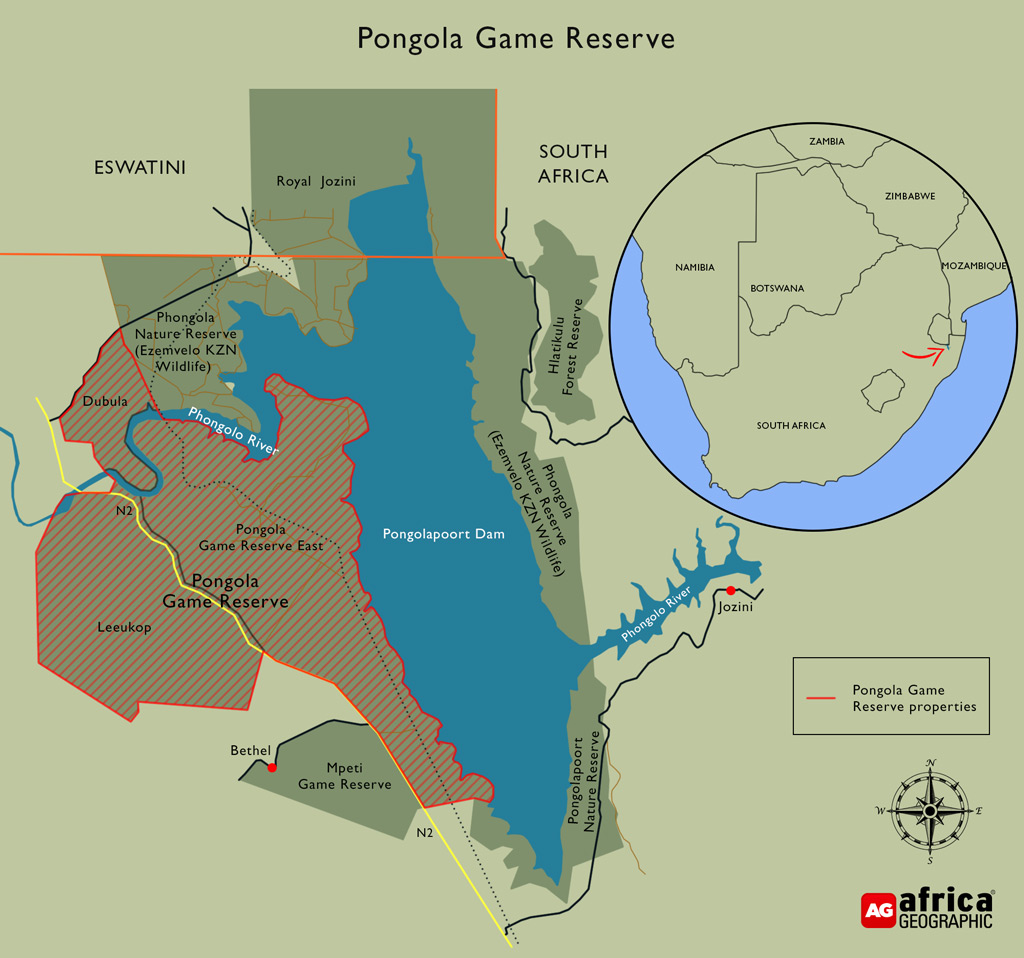
EDITOR’S COMMENT: Pongola Game Reserve in northern KwaZulu-Natal is home to an impressive array of wildlife, including four of the Big Five (excluding lion), hippopotamus and crocodile. The reserve (and in particular, one of its main landowners, the Karel Landman Trust) recently broke the news that it would no longer be keeping elephants on its property. In this opinion editorial, the general manager for Pongola Game Reserve, Malcolm Thomson, explains the management challenges that led the KLT to this decision. Africa Geographic has provided the reserve with the platform to lay these issues out on the table from the perspective of private landowners as a case study for how these practicalities play out on the ground. Views are the author’s own. One thing is clear: there are no easy answers when it comes to managing elephant populations in small reserves and finding humane and practical solutions to real problems.
Update 20 January 2023: There has been an increase in the number of human-wildlife conflict incidents on the eastern shores of Jozini Dam in recent months, with a reported 69 elephants roaming the dam’s shores after escaping Pongola Game Reserve East into Phongola Nature Reserve. According to the reports, at least 25 elephants have been killed in poaching incidents related to this conflict. In an incident on January 11th, tourists on a cruise boat on Jozini Dam were forced to take cover as poachers were firing shots nearby. Ezemvelo KZN Wildlife announced it will be engaging with the PGRE to translocate the elephants back onto the PGRE property or into a suitable protected area as early as March//April 2023. Ezemvelo said it had also engaged with the local community to discuss the recent incidents of human-wildlife conflict.
By Malcolm Thomson – General Manager: Pongola Game Reserve
The current situation regarding elephant management and maintenance of elephants on private property in South Africa has led to many private landowners who have elephants on their property having to rethink their positions on whether to keep them there. Many reserves are not dependent on the tourism value of these elephants. Current legislation, and the national norms and standards regarding their management, place so many restrictions on elephant management that, for many, it is no longer practical, viable or economically sustainable to host elephants.
Many years ago, when legislation in South Africa changed to allow private landowners to own the wildlife on their property, wildlife numbers increased substantially due to the establishment of many private game reserves and because wildlife had value. It became viable to maintain and manage wildlife on a sustainable-use basis (through both consumptive and non-consumptive utilisation). This benefited wildlife to such an extent that more land is conserved on private property in South Africa today than in state-owned reserves. Conservation can be defined as “the wise, sustainable utilisation of our natural resources”. Elephants are just one species of many that private landowners manage towards the goal of wise, sustainable utilisation.
The current restrictions on elephant management are set to reverse the above gains made in private wildlife management. Elephants will soon begin to disappear off private property as they no longer have any benefit to the private landowners, who are prevented from maintaining a viable and productive conservation business. If the current situation continues, one will probably only find elephants in state parks and a small number of private game reserves in the future.
Pongola’s position
Pongola Game Reserve has been in operation for nearly 50 years. The PGR’s (namely the Karel Landman Trust’s) revenue streams come from various sources. These include accommodation, ecotourism activities as well as consumptive utilisation (editor’s note: ‘consumptive wildlife utilisation’ in the wildlife industry refers to hunting, harvesting for the commercial sale of meat, local consumption, and the capturing and selling of live wildlife). We are dependent on our wildlife business to survive financially.
We can’t afford to subsidise species with utilisation restrictions, especially if they also destroy habitats that other species depend on. Elephants are major habitat changers and, if not managed in balance with the other species in a reserve, may degrade that habitat. This is happening in many of the habitats where elephants are present.
It is hard to argue that elephant populations in South Africa are in crisis, as many try to. Most elephant populations in South Africa substantially exceed the carrying capacities of the properties on which they occur. This is directly due to the legislative management restriction imposed by the government. The only crisis is that there are far too many elephants and nowhere for them to go.

In our case, Pongola Game Reserve was sold the vision of creating a transfrontier park (across South Africa and Eswatini) by the state. This has never materialised. We introduced elephants in 1997 as part of the transfrontier park vision. At the time, there were no restrictions placed on elephant management and they were managed in the same way as we manage all our other species, which is as it should be. Restrictions were only placed on their management in 2008 when the government issued National Norms and Standards for the Management of Elephants in South Africa. This was when our problems began.
Income through sustainable utilisation
Before detailing our challenges, it needs to be made clear that we own the elephants by definition of the law, and they are our assets. We carry 100% of their management costs. The government does not contribute financially to their management. Despite this fact, the state dictates how we are permitted to manage them. Our business is sustainable-utilisation based, and this is how we successfully manage all our other species, yet we are restricted on the management of our elephant.
Pongola Game Reserve cannot continue to run a business with the current unrealistic restrictions on the sustainable use of certain species. The associated red tape results in loss of potential income for the private wildlife industry. Landowners will resort to commercial farming due to their wildlife business becoming unviable – undoing the excellent progress made on land under conservation and reversing the increases made in wildlife numbers in South Africa.
Desperate times
One practical example of how this plays out is right on our doorstep, where one landowner, whose property previously formed part of the Pongola Game Reserve, changed his land use back to agriculture. This was due to the impracticalities associated with the excessive elephant numbers on the reserve and the financial implications. Once habitat for black rhinos, elephants and other wildlife, that area is now cleared of vegetation and planted with sugarcane.
Another example demonstrates the unmoving stance taken by the state. Pongola experienced a devastating drought between 2014 and 2020, which resulted in the reserve needing to cull a large number of zebra, blue wildebeest and impala to enable other species to have a better chance of survival. We also applied for the culling of 86 elephants as the population was already way above the reserve’s carrying capacity of 30 elephants. Our pleas were ignored with no sympathy or understanding for our situation.


Restrictions on elephant management
Several conditions need to be met before managers can be permitted to implement any lethal management solutions for elephants. While our previous management plan included approval for the hunting of a certain number of elephant bulls, the management plan for the next 10 years is currently under review. Until the plan is approved, we cannot hunt any bulls.
Among the conditions that need to be met before lethal management is approved, our most significant challenges are:
Range manipulation – provide proof that management is unable to expand the land available to the elephant:
There is only so much one can do to achieve “land expansion”, so this option is mainly unrealistic and is a temporary solution. All this does is delay the inevitable need to decrease numbers, as the population will become too large for an expanded property.
Translocation – provide proof that management is unable to find alternative properties to which excess elephants can be moved (involving capture and relocation):
The fact is that new properties to which elephants can be moved are scarce. For property owners with suitable habitats, many already have too many elephants themselves or don’t want to take elephants due to the current unrealistic management restrictions.
Contraception – implement contraception program on the females:
Contraception has no practical population management benefits. All it does is create an ageing population over a period of time. We do not believe that contraception is an ethical solution. Furthermore, it is a costly exercise.
The above conditions need to be met before one can revert to lethal management through culling and hunting. It takes years to reach this point, and in the time being, the elephant population continues to grow unchecked, with all the negative ramifications to the surrounding environment that go along with it. Properties need to monetise the population somehow to spend money on the population sustainably. For us, the only positive income balance to come from elephants is through controlled hunting.
While up until recently we were allowed to hunt bulls, we have not had access to these bulls for hunting. Elephants previously roamed the section of the Pongola Game Reserve northeast of the (N2) highway – within a total area of 8,497 ha in size (including Dubula and the PGRE property – see map below). During the drought when Pongolapoort Dam levels were low, and due to overpopulation, the elephants moved around the boundary fences at the dam onto the Royal Jozini Big 6 Private Estate in Eswatini. After that, a large portion of the population moved around the northern side of the dam back into South Africa onto the eastern shores of Ezemvelo KZN Wildlife’s Phongolo Nature Reserve. There is a standard game fence (with electric strands) between Dubula and the Phongolo Nature Reserve, but the low water levels enabled elephants to move to Phongolo.
While water levels have now risen, elephants can still, and do, cross on occasion. The elephants are still in Royal Jozini Big 6 Private Estate and Phongolo Nature Reserve, with the occasional movement of some elephants into Pongola Game Reserve. Neither Ezemvelo KZN Wildlife nor the Royal Jozini Big 6 Private Estate will permit any lethal management (in the form of hunting or culling) while the elephants are still on their properties. Due to the high numbers of elephant they will continue to occupy these new areas. Without culling and hunting, the elephant population will continue to reach high numbers.
Furthermore, the 2022 hunting and export quota for elephant, black rhino and leopard has been suspended, due to a court application by The Humane Society International – Africa against the Minister of Forestry, Fisheries and the Environment, for not following due process in the allocation of these quota. As such Ezemvelo KZN Wildlife will not be issuing any hunting or export permits for these species.

Legislation states that, when culling, managers need to cull an entire herd at once (and not just a portion of the herd or selectively cull individuals over time). This brings challenges of its own. Practically speaking, how would one dispose of 85 carcasses simultaneously? In a country where poverty and hunger are all around us, you cannot waste a valuable protein source.
We should be permitted to manage our elephants the same way we do all our other species. The argument that elephants are more “special” than other species is not valid: all species should be managed under similar principles.
Due to all of the above, it is not practical, beneficial or economically viable for Pongola Game Reserve to continue maintaining elephants.
Our decision to remove elephants in the near future has resulted in the engagement and the attention of the National Department of Forestry, Fisheries and the Environment (DFFE) and Ezemvelo KZN Wildlife. Ezemvelo KZN Wildlife indicated that they are currently drafting a proposal (for the bigger picture and Pongola area) which is awaiting approval from their head office before being submitted to us for discussion. It became clear through our engagement that we are not unique regarding our concerns, as there are many other private properties currently in the same position. DFFE has undertaken to investigate improvements in this regard.
Our decision to remove elephants will stand unless the ‘bigger picture proposal’ being developed by Ezemvelo KZN Wildlife is beneficial to the goals of our elephant management. Similarly, if the new National Norms and Standards for the Management of Elephants in South Africa being drafted by the government are not beneficial to the management of elephant on private property and our goals of sustainable utilisation, then there is no point in keeping the elephant and a decision will need to made on how to achieve their removal. This will take some time to implement, as this on its own brings several logistical issues.
Rethinking the future of elephant management
The reality for the private wildlife industry and the business of conservation is that the adage of “if it pays, it stays” holds. The state will have to rethink current legislation if elephant populations are to remain on private properties and reserves in the future.
We in the private wildlife industry are professionals in what we do. Let us do what we do best to benefit wildlife in South Africa, which can thrive through sustainable use management, as we have proved in the past and continue to do.
Note: On 4 May 2022, Pongola Game Reserve received feedback from Minister of Forestry, Fisheries and the Environment, Barbara Creecy, commenting on Examvelo KZN Wildlife’s commitment to developing a joint management agreement with private sector stakeholders. The letter states there is a “need for innovative and balanced partnership arrangements between state protected areas and adjacent private wildlife areas.” These, Creecy states in the letter, “result in win-win sustainable arrangements, with strong conservation outcomes, and which stimulate the local economy through biodiversity-based enterprises.” The letter further reads, “reaching such agreements in Pongola can provide an important model for success, and I encourage all stakeholder [sic] to work collaboratively, with meaningful participation, to quickly craft the joint management plan [for elephants], and give momentum to economic growth of the area.”
Related reading
Do we have elephant problem? There are no simple answers. Read our report on the facts.
Is there a direct link between elephants and the ongoing loss of large trees? A recent study suggests elephants benefit ecosystems (in open systems) by improving plant diversity. Read more about this here.
Researchers suggest adapting conservaton strategies to the sentience of elephants. Read more here.
To comment on this story: Login (or sign up) to our app here - it's a troll-free safe place 🙂.![]()







